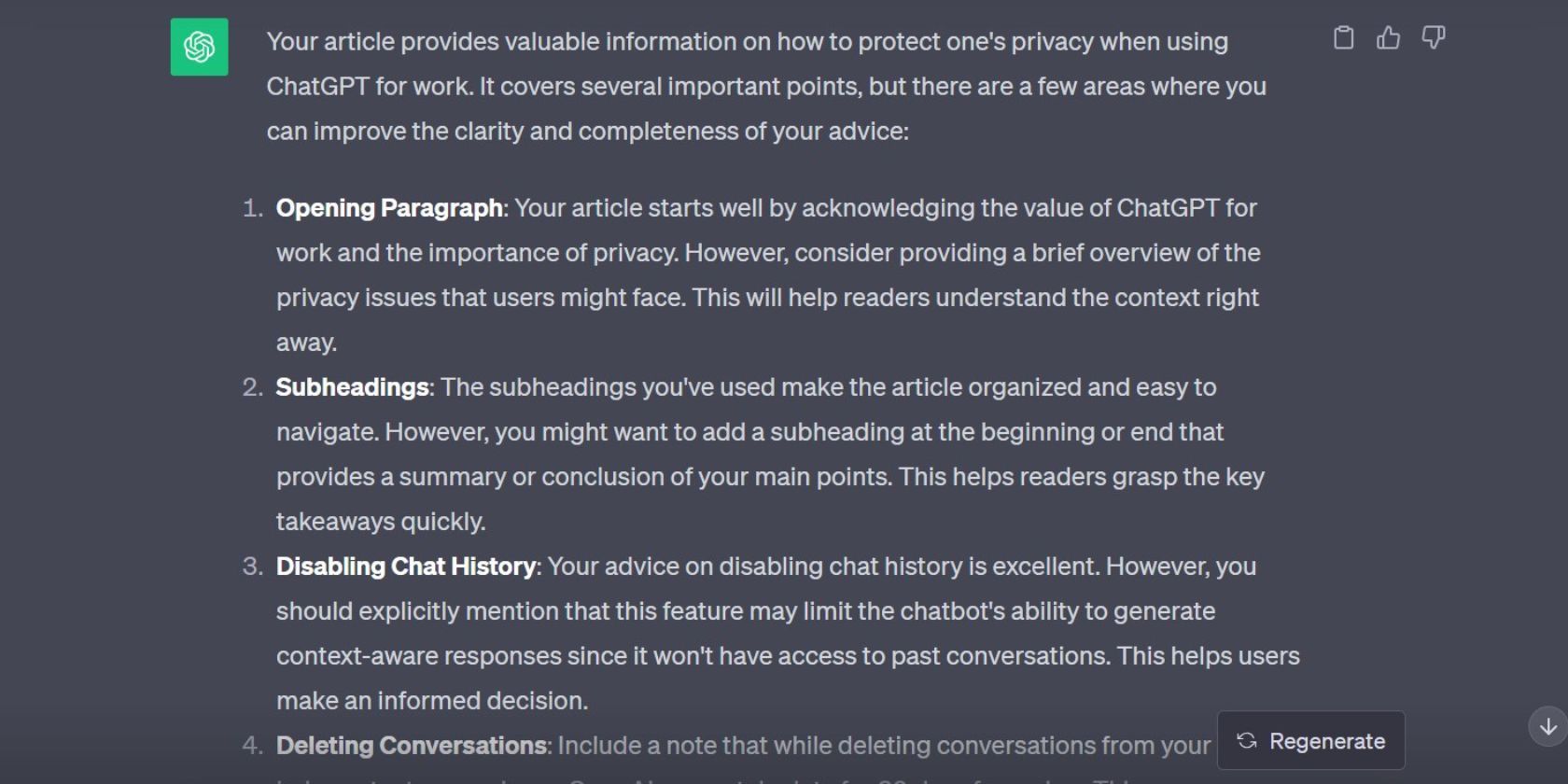6 Ways to Use ChatGPT for Remote and Freelance Work
ChatGPT can help you with your unique challenges as a freelancer or remote worker. It offers many applications, allowing you to quickly draft content, generate ideas, and more. Let’s explore the most helpful ways you can utilize ChatGPT for remote or freelance work.
1. Use ChatGPT to Draft Emails
A significant portion of any remote worker’s day includes crafting messages to clients, team members, or collaborators. ChatGPT can craft clear and concise emails. However, it's essential to verify the accuracy of the information provided.
When writing professional emails, remember to give ChatGPT the necessary context. Are you talking to a client or a team member? What details do you want included in your email? However, don’t give complex instructions, which is one of the ChatGPT prompt mistakes to avoid.
If you’re concerned about protecting your privacy while using ChatGPT, you can ask the AI to write a generic email as we did in the prompt in the photo below. Afterward, you can add more information to make the email more personal.
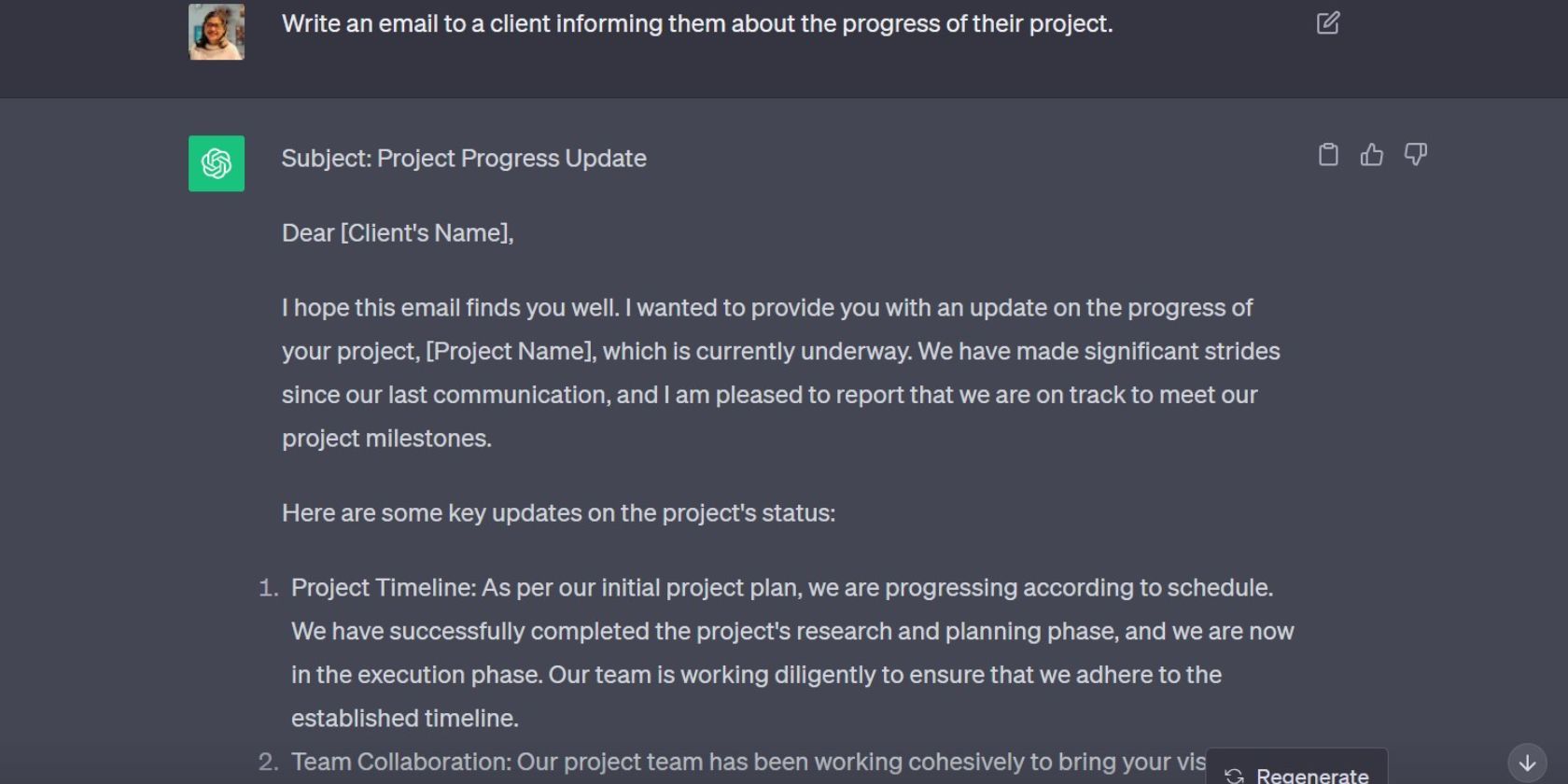
Example prompts for emails:
“Write an email to a client informing them about the progress of their project.” “I need to distribute the meeting minutes to my team. Help me draft an email to share the minutes and action items. [Insert the draft].” “I’d like to request feedback from a client on our recent project. Can you help me write an email seeking their insights and suggestions?” “I’ve decided to decline a job offer from Company X. Assist me in composing a professional and gracious email.”Tip: Using AI prompts is very simple. Give instructions using natural, conversational language. However, learning prompting techniques to improve your ChatGPT responses is also beneficial.
2. Use ChatGPT for Problem-Solving and Decision-Making
Many freelance workers run their businesses as sole proprietors to keep expenses low. You might find yourself struggling with problems or making critical decisions independently. Thankfully, ChatGPT can serve as your trusted partner in these situations. Whether you need guidance on a tough decision or run into a challenging problem, ChatGPT can provide insights and suggestions to help you take action.
ChatGPT's responses are currently based on a September 2021 knowledge cut-off, but the AI can still give you practical tips and advice for simple technical concerns, as shown in the photo below.
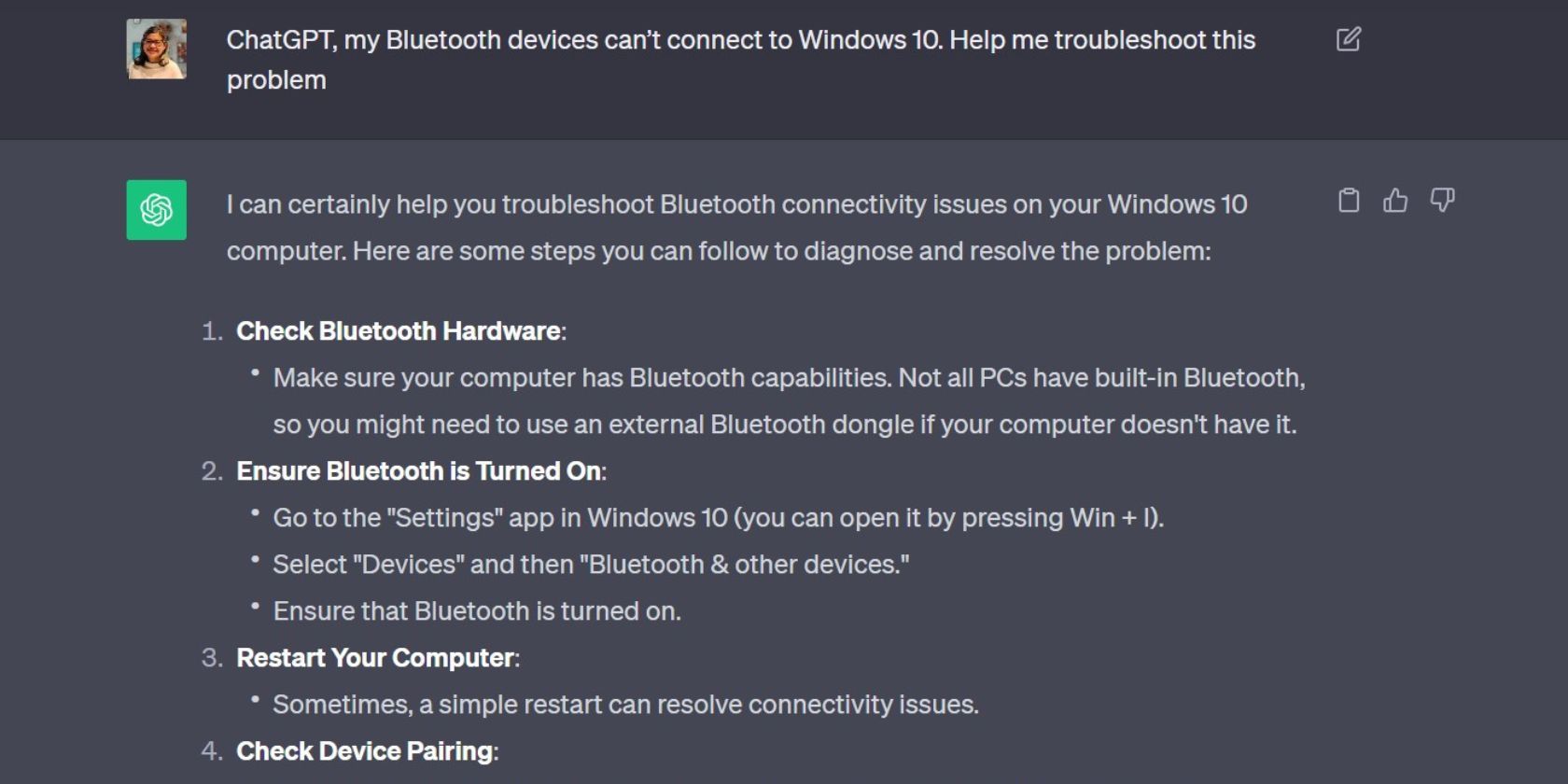
Example prompts:
“ChatGPT, my Bluetooth devices can’t connect to Windows 10. Help me troubleshoot this problem.” “ChatGPT, I’m facing a challenge in my current project. [provide context]. Can you suggest some strategies to overcome it?” “I need to decide between two potential clients for an upcoming project. [provide context]. Help me weigh the pros and cons.”3. Use ChatGPT to Research and Learn New Concepts
ChatGPT provides new avenues for learning, especially for those working an online job. Many freelancers need to upskill to remain relevant in a world where artificial intelligence is gaining ground. Ironically, AI or ChatGPT itself can accelerate your learning journey.
ChatGPT can be your virtual tutor, offering general information on various topics. ChatGPT can simplify complex issues, reducing your time spent on research and reading.
To prevent AI hallucinations, use a credible source as a reference. In the photo below, we instructed ChatGPT to extract the key points from Encyclopedia Britannica's article on artificial intelligence. We also asked the AI to use bullet points and simple language.
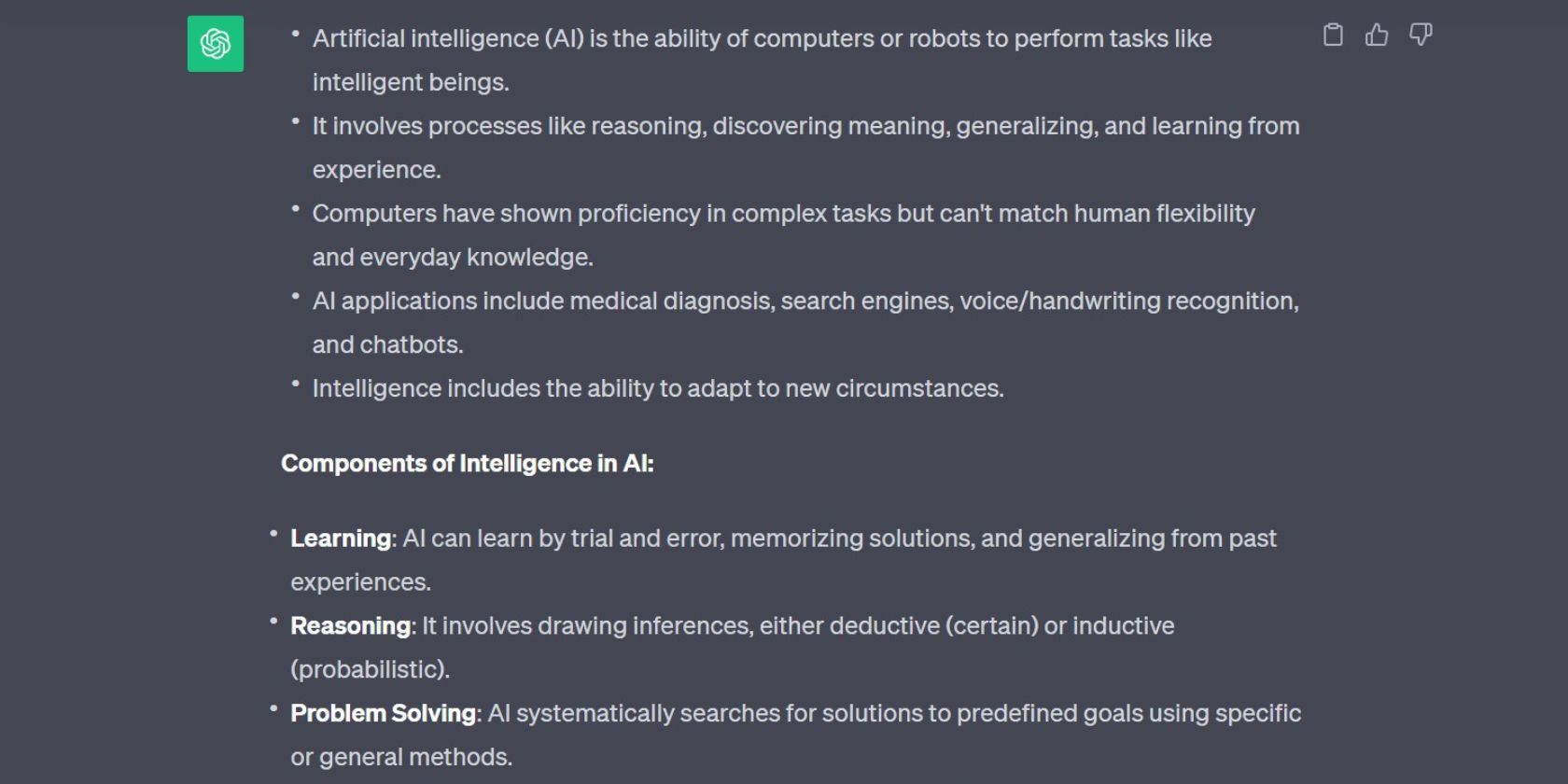
Example prompts:
“ChatGPT, explain the basics of cryptocurrency to me.” “Here’s an article on data privacy and security. Extract the most relevant information using bullet points and explain them in simple language.[Insert article].” “I’m interested in learning about artificial intelligence. Where should I start?”4. Use ChatGPT to Create Content
For freelancers and remote workers involved in content creation, ChatGPT can provide a valuable starting point. You can use it to generate ideas, blog outlines, or even entire blocks of text.
Generating fresh ideas is one of the most important tasks of freelancers and remote workers in leadership roles or those in the creative industry. With ChatGPT, you can quickly combat creative block. It can be your brainstorming partner, helping you view a topic from different angles.
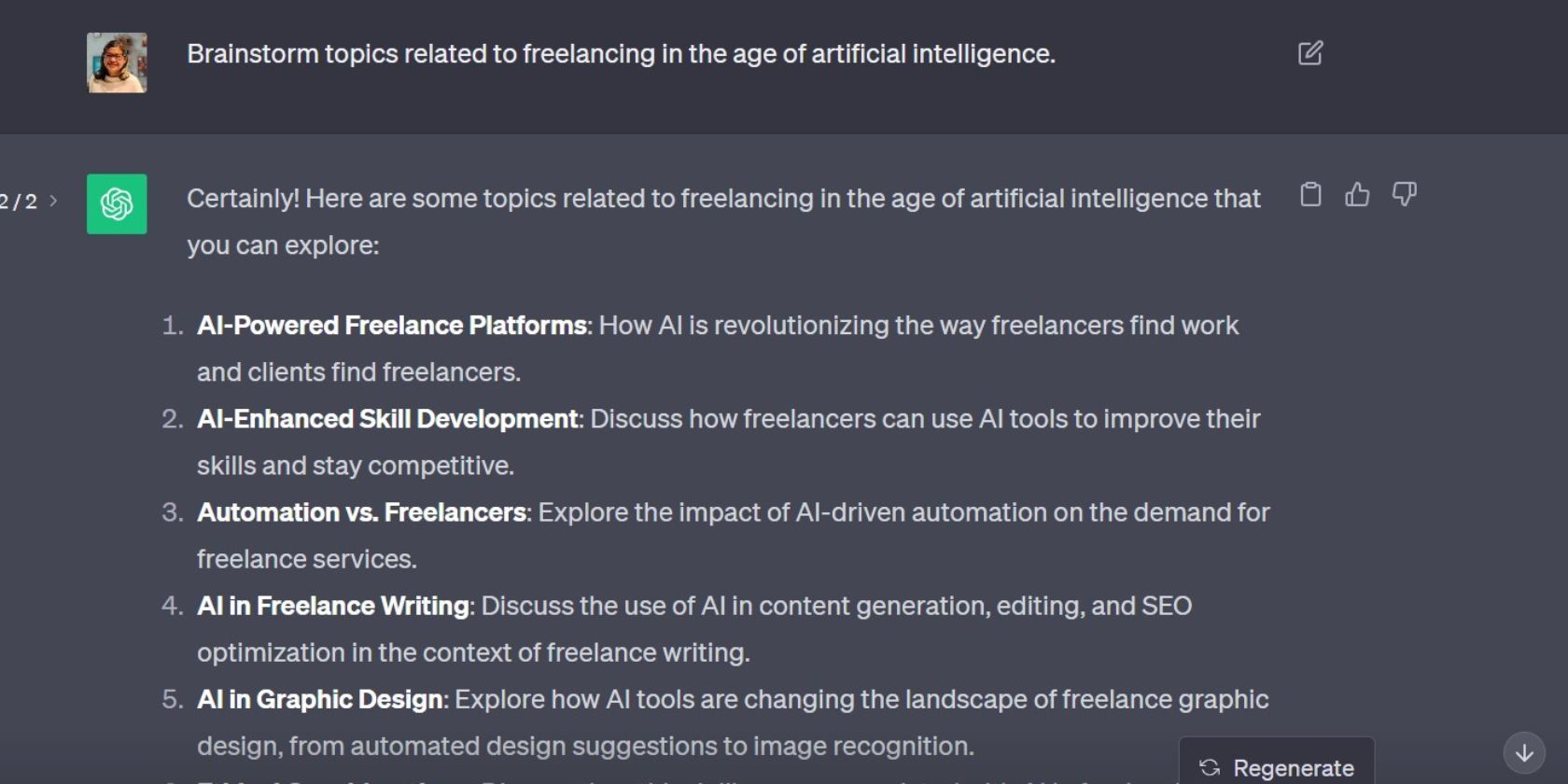
Remember that ChatGPT can also give very generic results if you're using it to write content. This is why you should view it as a tool rather than a replacement. Always edit and proofread ChatGPT answers. Check for tone and word choice, as its responses can sound impersonal and robotic unless you train ChatGPT to write like you.
Example prompts:
“Brainstorm topics related to freelancing in the age of artificial intelligence.” “Create a blog outline for my article on [topic].” “Please review this paragraph and suggest revisions. [Insert text]. “I am a freelance graphic designer. Help me create a content calendar for December. The goal is to gain new clients and expand my reach.”5. Use ChatGPT for Editing, Proofreading, and Translation
ChatGPT can help you edit and proofread you content. Unlike Grammarly, ChatGPT can revise your content to fit a variety of styles and tones. It can be your language support tool, assisting with grammar checks and providing detailed critiques to improve your writing.
In the photo below, we asked ChatGPT to review an article draft. You don't have to apply all of ChatGPT's suggestions, but the comments are a good starting point for feedback before submitting work to clients.
You can also use ChatGPT as a language-translation tool. Tools like Google Translate attempt to bridge language barriers. However, you can’t interact with Google Translate in the same way you can converse with ChatGPT. By providing context, asking follow-up questions, or offering additional information, you can get more accurate results with ChatGPT.
Currently, we don’t suggest using ChatGPT to translate content for distribution to your colleagues or teammates. Like other apps, it still can't fully capture the nuances of certain expressions. If you can’t edit or proofread in the translated language or find someone who can, it’s better to use ChatGPT for simple language queries.
Example prompts:
“ChatGPT, check this document for grammar and language errors.” “Revise these social media captions. Use a witty and funny tone.” “Review this blog I wrote for a nonprofit. The goal is to get new donors for our new project. In what ways can I improve it?” "My Filipino colleague just asked me ‘Hoy! Kamusta kana’. What does this mean?"6. Use ChatGPT for Temporary Mental Health Support
Remote work can sometimes lead to burnout or feelings of isolation. ChatGPT can support your well-being by engaging in casual conversation, offering motivational messages, or suggesting self-care practices.
Of course, AI can’t replace the comforting presence of another human being. But if you can’t find anyone to talk to, you can temporarily use ChatGPT safely as your mental health coach. Instruct it to give you advice using a specific point of view, philosophy, or perspective to get tailored responses for your situation.
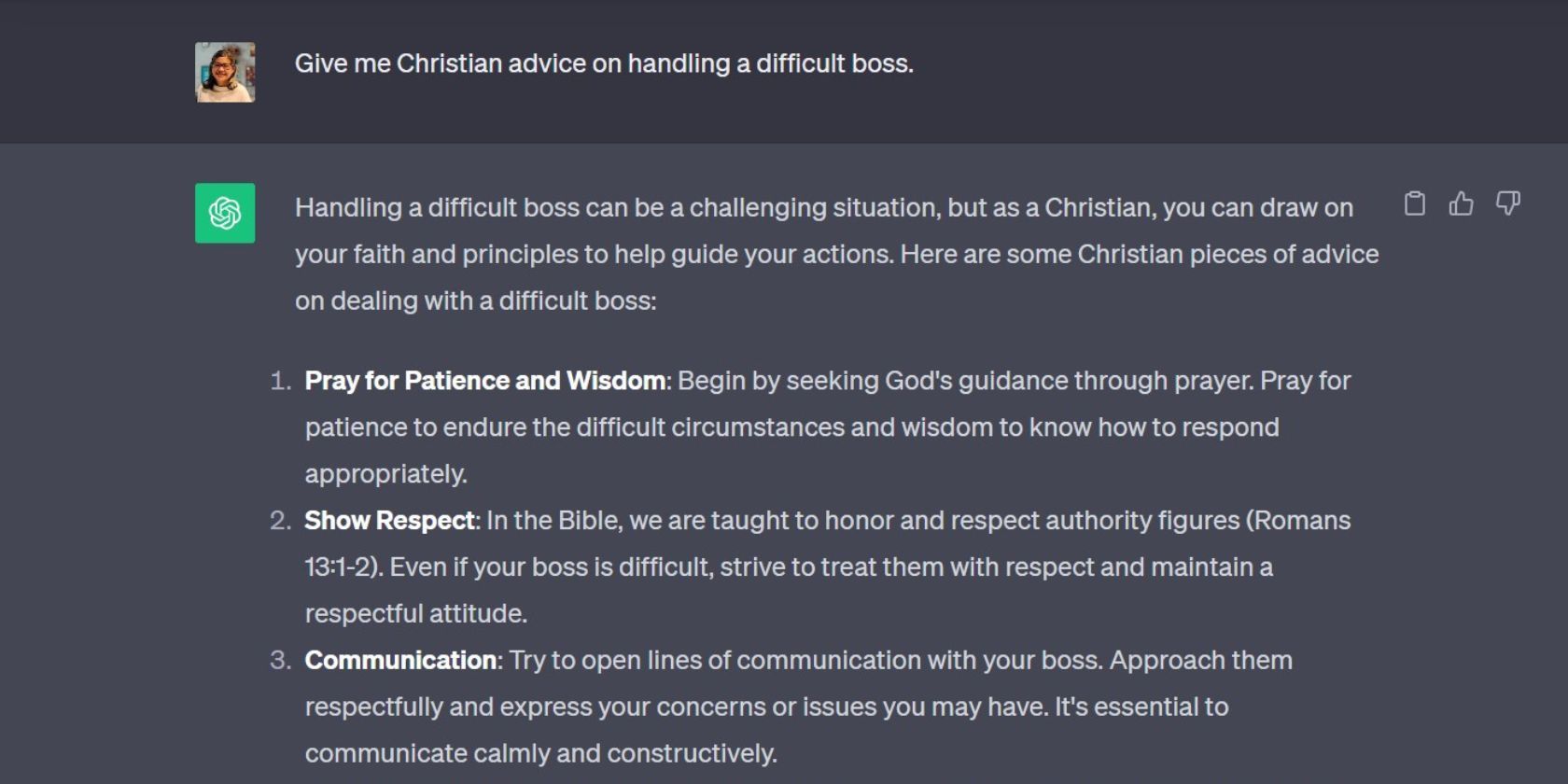
Example prompts:
“ChatGPT, share a quote to kickstart my workday on a positive note.” “I’m so stressed about work! Give suggestions for a quick work break.” “Tell me a joke to lighten the mood and keep me motivated.” “Give me Christian advice on handling a difficult boss.”Maximize ChatGPT for Freelance and Remote Work
While concerns about automation replacing human jobs are valid, we must also understand that ChatGPT can be a helpful tool rather than a threat. There are numerous ways to harness the capabilities of ChatGPT to help you in your freelance or remote tasks.
The versatile and interactive features of ChatGPT make it an ideal assistant. However, it’s important to maintain a balance, recognizing that ChatGPT is most effective when used with human judgment and expertise. When used responsibly, ChatGPT can be a valuable tool for various remote and freelance tasks.
-
 Swarm Intelligence Algorithms: Three Python ImplementationsImagine watching a flock of birds in flight. There's no leader, no one giving directions, yet they swoop and glide together in perfect harmony. It may...AI Posted on 2025-03-24
Swarm Intelligence Algorithms: Three Python ImplementationsImagine watching a flock of birds in flight. There's no leader, no one giving directions, yet they swoop and glide together in perfect harmony. It may...AI Posted on 2025-03-24 -
 How to Make Your LLM More Accurate with RAG & Fine-TuningImagine studying a module at university for a semester. At the end, after an intensive learning phase, you take an exam – and you can recall th...AI Posted on 2025-03-24
How to Make Your LLM More Accurate with RAG & Fine-TuningImagine studying a module at university for a semester. At the end, after an intensive learning phase, you take an exam – and you can recall th...AI Posted on 2025-03-24 -
 What is Google Gemini? Everything You Need To Know About Google’s ChatGPT RivalGoogle recently released its new Generative AI model, Gemini. It results from a collaborative effort by a range of teams at Google, including members ...AI Posted on 2025-03-23
What is Google Gemini? Everything You Need To Know About Google’s ChatGPT RivalGoogle recently released its new Generative AI model, Gemini. It results from a collaborative effort by a range of teams at Google, including members ...AI Posted on 2025-03-23 -
 Guide on Prompting with DSPyDSPy: A Declarative Framework for Building and Improving LLM Applications DSPy (Declarative Self-improving Language Programs) revolutionizes LLM appli...AI Posted on 2025-03-22
Guide on Prompting with DSPyDSPy: A Declarative Framework for Building and Improving LLM Applications DSPy (Declarative Self-improving Language Programs) revolutionizes LLM appli...AI Posted on 2025-03-22 -
 Automate Blog To Twitter ThreadThis article details automating the conversion of long-form content (like blog posts) into engaging Twitter threads using Google's Gemini-2.0 LLM,...AI Posted on 2025-03-11
Automate Blog To Twitter ThreadThis article details automating the conversion of long-form content (like blog posts) into engaging Twitter threads using Google's Gemini-2.0 LLM,...AI Posted on 2025-03-11 -
 Artificial Immune System (AIS): A Guide With Python ExamplesThis article explores artificial immune systems (AIS), computational models inspired by the human immune system's remarkable ability to identify a...AI Posted on 2025-03-04
Artificial Immune System (AIS): A Guide With Python ExamplesThis article explores artificial immune systems (AIS), computational models inspired by the human immune system's remarkable ability to identify a...AI Posted on 2025-03-04 -
 Try Asking ChatGPT These Fun Questions About YourselfEver wondered what ChatGPT knows about you? How it processes the information you've fed it over time? I've used ChatGPT heaps in different sce...AI Published on 2024-11-22
Try Asking ChatGPT These Fun Questions About YourselfEver wondered what ChatGPT knows about you? How it processes the information you've fed it over time? I've used ChatGPT heaps in different sce...AI Published on 2024-11-22 -
 Here\'s How You Can Still Try the Mysterious GPT-2 ChatbotIf you're into AI models or chatbots, you might have seen discussions about the mysterious GPT-2 chatbot and its effectiveness.Here, we explain wh...AI Published on 2024-11-08
Here\'s How You Can Still Try the Mysterious GPT-2 ChatbotIf you're into AI models or chatbots, you might have seen discussions about the mysterious GPT-2 chatbot and its effectiveness.Here, we explain wh...AI Published on 2024-11-08 -
 ChatGPT’s Canvas Mode Is Great: These Are 4 Ways to Use ItChatGPT's new Canvas mode has added an extra dimension to writing and editing in the world's leading generative AI tool. I've been using C...AI Published on 2024-11-08
ChatGPT’s Canvas Mode Is Great: These Are 4 Ways to Use ItChatGPT's new Canvas mode has added an extra dimension to writing and editing in the world's leading generative AI tool. I've been using C...AI Published on 2024-11-08 -
 How ChatGPT\'s Custom GPTs Could Expose Your Data and How to Keep It SafeChatGPT's custom GPT feature allows anyone to create a custom AI tool for almost anything you can think of; creative, technical, gaming, custom G...AI Published on 2024-11-08
How ChatGPT\'s Custom GPTs Could Expose Your Data and How to Keep It SafeChatGPT's custom GPT feature allows anyone to create a custom AI tool for almost anything you can think of; creative, technical, gaming, custom G...AI Published on 2024-11-08 -
 10 Ways ChatGPT Could Help You Land a Job on LinkedInWith 2,600 available characters, the About section of your LinkedIn profile is a great space to elaborate on your background, skills, passions, and f...AI Published on 2024-11-08
10 Ways ChatGPT Could Help You Land a Job on LinkedInWith 2,600 available characters, the About section of your LinkedIn profile is a great space to elaborate on your background, skills, passions, and f...AI Published on 2024-11-08 -
 Check Out These 6 Lesser-Known AI Apps That Provide Unique ExperiencesAt this point, most folks have heard of ChatGPT and Copilot, two pioneering generative AI apps that have led the AI boom.But did you know that heaps o...AI Published on 2024-11-08
Check Out These 6 Lesser-Known AI Apps That Provide Unique ExperiencesAt this point, most folks have heard of ChatGPT and Copilot, two pioneering generative AI apps that have led the AI boom.But did you know that heaps o...AI Published on 2024-11-08 -
 These 7 Signs Show We\'ve Already Reached Peak AIWherever you look online, there are sites, services, and apps proclaiming their use of AI makes it the best option. I don't know about you, but it...AI Published on 2024-11-08
These 7 Signs Show We\'ve Already Reached Peak AIWherever you look online, there are sites, services, and apps proclaiming their use of AI makes it the best option. I don't know about you, but it...AI Published on 2024-11-08 -
 4 AI-Checking ChatGPT Detector Tools for Teachers, Lecturers, and BossesAs ChatGPT advances in power, it's getting harder to tell what's written by a human and what's generated by an AI. This makes it hard for...AI Published on 2024-11-08
4 AI-Checking ChatGPT Detector Tools for Teachers, Lecturers, and BossesAs ChatGPT advances in power, it's getting harder to tell what's written by a human and what's generated by an AI. This makes it hard for...AI Published on 2024-11-08 -
 ChatGPT\'s Advanced Voice Feature Is Rolling Out to More UsersIf you have ever wanted to have a full-blown conversation with ChatGPT, now you can. That is, as long as you pay for the privilege of using ChatGPT. M...AI Published on 2024-11-08
ChatGPT\'s Advanced Voice Feature Is Rolling Out to More UsersIf you have ever wanted to have a full-blown conversation with ChatGPT, now you can. That is, as long as you pay for the privilege of using ChatGPT. M...AI Published on 2024-11-08
Study Chinese
- 1 How do you say "walk" in Chinese? 走路 Chinese pronunciation, 走路 Chinese learning
- 2 How do you say "take a plane" in Chinese? 坐飞机 Chinese pronunciation, 坐飞机 Chinese learning
- 3 How do you say "take a train" in Chinese? 坐火车 Chinese pronunciation, 坐火车 Chinese learning
- 4 How do you say "take a bus" in Chinese? 坐车 Chinese pronunciation, 坐车 Chinese learning
- 5 How to say drive in Chinese? 开车 Chinese pronunciation, 开车 Chinese learning
- 6 How do you say swimming in Chinese? 游泳 Chinese pronunciation, 游泳 Chinese learning
- 7 How do you say ride a bicycle in Chinese? 骑自行车 Chinese pronunciation, 骑自行车 Chinese learning
- 8 How do you say hello in Chinese? 你好Chinese pronunciation, 你好Chinese learning
- 9 How do you say thank you in Chinese? 谢谢Chinese pronunciation, 谢谢Chinese learning
- 10 How to say goodbye in Chinese? 再见Chinese pronunciation, 再见Chinese learning

